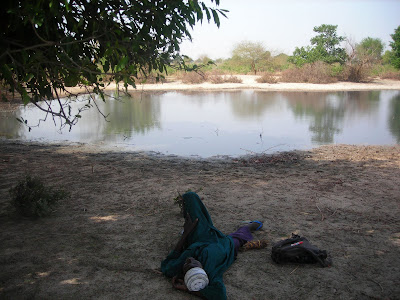I think Wolof culture has something to teach the world about dealing with conflict. To be sure, there is social conflict here in Senegal. Arguments happen, people scold each other, feelings are hurt, and fights occur. But it seems to me that there is an important element of the culture that helps guard against these types of social conflict: in general, it’s not socially acceptable for an adult person to be angry. It is seen as childish.
When I have been angry around my fellow villagers, they’ve tried to calm me or poked fun at me in a way to say, “that’s not ok.” Some months ago I scolded the women’s group president’s husband, Tam, and told him he was “ruining the garden” when he removed some mulching I had put down. Everyone who was within earshot laughed and started repeating what I had said, as if it were the punch-line to a joke, and in the months since, I continue to hear it being repeated once in a while. At the moment it didn’t do much to lessen my frustration, but later I recalled the situation and realized that this was a way of socially pressuring me not to be upset.
It seems like humor is used as a rampart against conflict in Senegalese society. Senegalese humor is usually directed at someone; someone is always the brunt of the joke. I’ve only watched a little bit of TV here (having no electricity in my village), but my impression of the comedy shows is that they follow foolish people doing foolish things, and there is a lot of slapstick involved. “Yo mama” jokes would translate pretty well into Senegalese culture; Seinfeld-type stand-up with its social commentary, not so much.
Angry people are teased. And from a young age, kids are the brunt of jokes, and they learn not to take it as an affront to their self esteem. There are “joking relationships” between families; as an Njay, I am often teased by people with the last name Diop that I am greedy and stupid, that I can’t work, that I am a bad Muslim and don’t fast during Ramadan (true- although I did fast for one day). I think that all of this joking leads people to be less easily affronted and irritable.
But aversion to anger might have its drawbacks. Is anger not necessary, in struggle for justice and in standing up to powers that be?
A couple months ago I was in the back seat of a sept-place from Dakar to Kaolack, and struck up a conversation with one of my fellow passengers. He was Senegalese, but told me he lives in Barcelona, where he runs a bar. He was home on vacation, and was going to Kaolack to visit a friend from Spain’s family and deliver gifts. We got to talking about politics. Like the majority of Senegalese I’ve had political discussions with, he opposed the current president, Abdoulaye Wade, who he felt is using the spoils of office for personal benefit and to ensure his victory in the upcoming 2012 elections. I remember he was very critical of what he saw as Senegalese people’s passivity. It was just after the Tunisian and Egyptian uprisings, but he said that nothing like that could happen here, because most Senegalese people are unwilling to take to the streets and become involved in conflict- it is too taboo. He worried that Wade would be able to slowly consolidate power in his own family’s hands, dismantling the democracy that he was once a symbol of (Wade won the first free elections in 2000, ending the Socialist Party’s rule, and again in 2007).
However, several months later, the sept-place acquaintance was proven wrong. Defying cultural tendencies, thousands of Senegalese people took to the streets in Dakar and other cities in late June to oppose a proposed constitutional change regarding the election process. The proposal would have decreased the threshold to avoid a run-off vote to 25% (which probably would have guaranteed Wade victory, since the opposition hasn’t united around a single candidate), and would have created an office of vice-President, which people say is a vehicle for hoisting Wade’s son into the presidency (Wade is already at least 85, and might not be able to continue as president much longer). The protesters were successful, and the changes were not passed, even though Wade’s party controls enough seats in Parliament to do so.
In this case, it seems like a willingness to struggle and engage in conflict had positive results. Protestors were angry, and some were violent (although it is hard to say how much of the violence was provoked by police forces). But I suspect the protestors held something else in their minds besides anger – hope, a vision of what a more free society would look like? Maybe anger is usually self-destructive, preventing us from engaging with who or what we love. But is it always that way?
Some recent photos:

My two bros, Alhadji and Babakar, and myself. They were dressed up one day and I had just come back from work.
 The landscape has turned green since the rains.
The landscape has turned green since the rains. Women at the women's garden planting a line of Moringa for erosion control. The ladies dress up for work in outfits like this almost every day.
Women at the women's garden planting a line of Moringa for erosion control. The ladies dress up for work in outfits like this almost every day. My friend Papa at a small pond near my village, a cool place to hang out.
My friend Papa at a small pond near my village, a cool place to hang out.
Humor as a means to deal with conflict is not unique to Senegalese!
ReplyDeleteLove it!